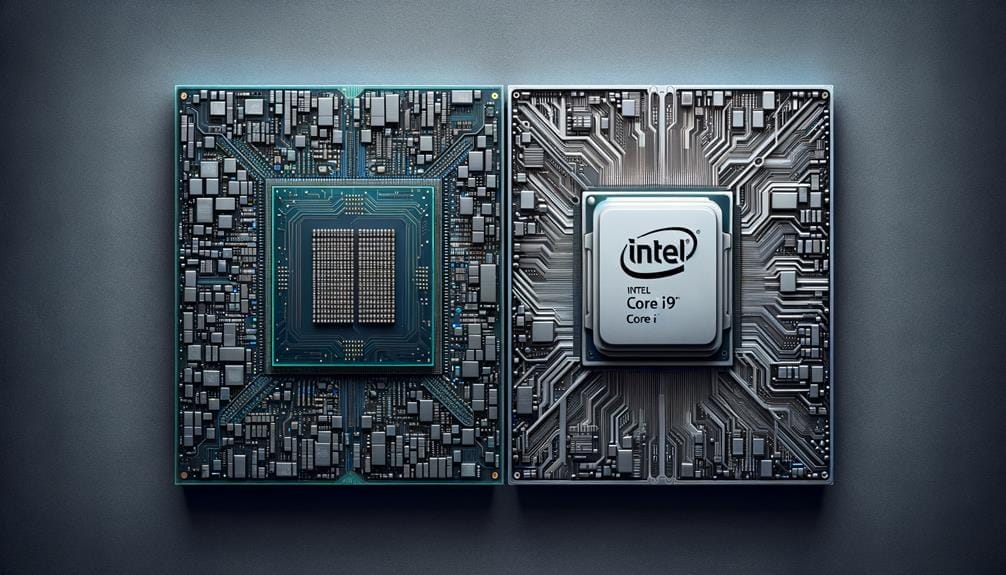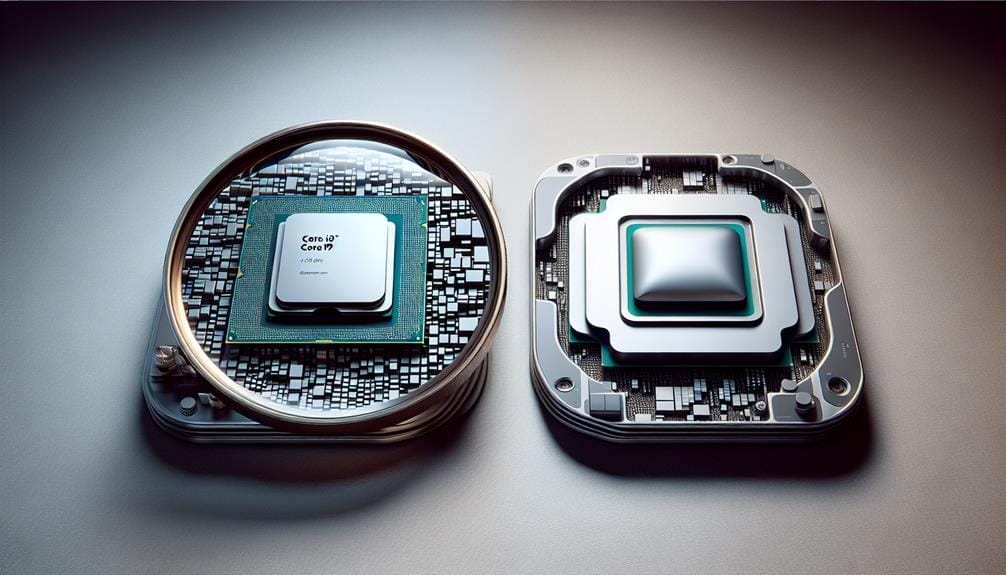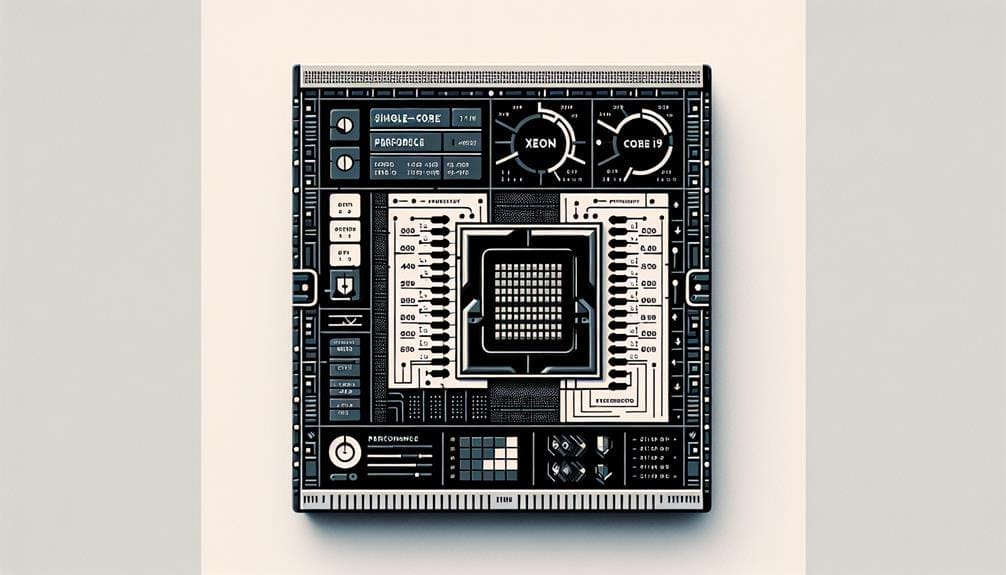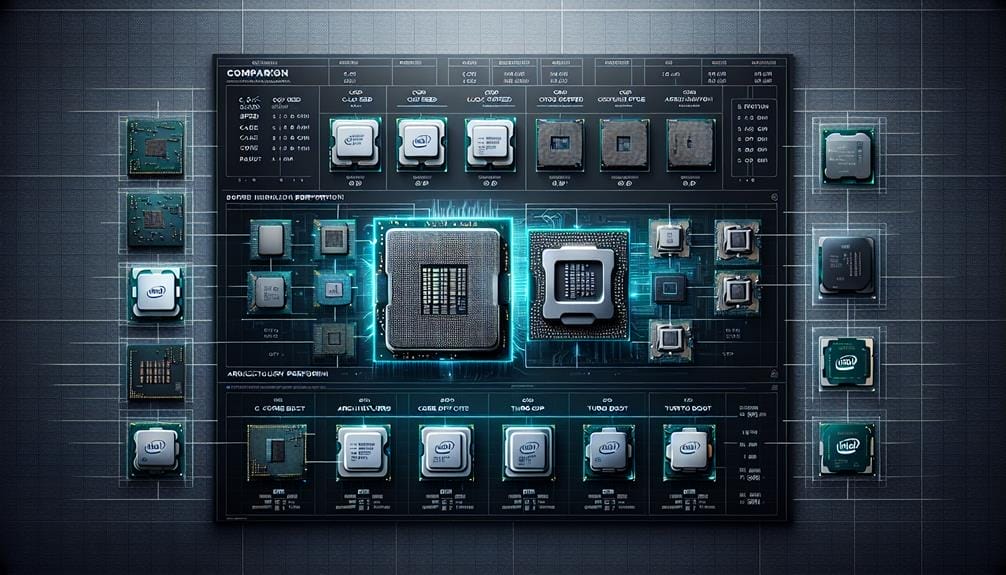Intel Xeon Vs Core I9: Ultimate CPU Showdown

When considering cutting-edge computing solutions, choosing between Intel’s Xeon or Core i9 processors requires careful consideration.
Both CPU series offer distinct advantages tailored to specific use cases, and understanding the nuances of their capabilities is essential for making informed decisions.
As we explore the intricate differences in core counts, architecture, and pricing, we'll uncover the unique strengths and trade-offs of each CPU, shedding light on which is better suited for high-intensity workloads, parallelized tasks, or expansion needs.
This comparison promises to unveil the crucial insights necessary for users to discern the most suitable CPU for their specific requirements, providing a comprehensive perspective that goes beyond mere specifications.
Key Takeaways
- Intel Core i9 CPUs have better single-core performance compared to Intel Xeon CPUs.
- Intel Xeon CPUs offer better multi-core performance, making them suitable for highly-parallelized workloads.
- Intel Core i9 CPUs are more affordable compared to the higher-end Xeon CPUs.
- Intel Xeon CPUs have superior expansion capacity with support for more PCIe lanes, dual-socket motherboards, larger memory configurations, and better ECC RAM support.
Intel Core I9 Overview

The Intel Core i9 series represents the pinnacle of Intel's mainstream consumer CPUs, boasting unparalleled performance and cutting-edge features. With high core counts, clock speeds, and cache sizes, Intel Core i9 CPUs offer exceptional single-core and multi-core performance.
The top-tier Intel Core i9-13900K, for instance, delivers remarkable single-core performance crucial for general productivity workloads. In comparison, Xeon CPUs prioritize multi-threaded performance for highly-parallelized workloads, excelling in tasks like video rendering and machine learning.
While Intel Core i9 CPUs provide top-tier performance for mainstream desktop usage, the Xeon CPUs offer better multi-core performance at a higher cost. Additionally, the Intel Core i9 processors are integrated with the Intel Rocket Lake architecture, providing 20 PCIe 4.0 lanes, whereas Xeon processors, such as Cascade Lake, offer up to 112 PCIe lanes, supporting larger memory configurations and ECC RAM, ideal for high-sensitivity data storage.
Intel Xeon Overview
Pivoting from the Intel Core i9 overview, the Intel Xeon series represents a distinct category of high-performance server CPUs designed to excel in multi-threaded, highly-parallelized workloads and offer expanded expansion capacity for specialized computing needs.
Intel Xeon Overview:
- Intel Xeon Architecture
- Built for servers, featuring robust multi-threading capabilities
- Designed for demanding enterprise workloads
- Support for larger memory configurations and ECC RAM
- Intel Xeon Server Market
- Dominates the server CPU market
- Widely used in data centers and enterprise environments
- Offers scalability and reliability for mission-critical applications
- Technical Specifications
- High core counts for parallel processing
- Enhanced expansion capacity with support for numerous PCIe lanes
- Optimized for heavy workloads such as virtualization, AI, and data analytics.
Single-Core Performance

Comparing the single-core performance of Intel Xeon and Core i9 CPUs reveals crucial distinctions in their respective capabilities for handling individual-thread workloads.
Single-core performance holds immense importance for general productivity workloads, where Intel Core i9 CPUs exhibit significantly better performance. Both CPUs utilize cores of the same or similar architecture; however, the increasing core count in Xeon CPUs has an impact on per-core performance. Nevertheless, lower core-count Xeons can reach parity with Core CPUs in single-threaded performance.
Intel Core i9 CPUs, known for pushing the limits of mainstream desktop performance, demonstrate the impact of high single-core performance. This aspect is particularly influential in tasks like gaming and single-threaded applications, where the Core i9 CPUs excel.
Multi-Core Performance
In multi-core performance analysis, it is essential to consider the scalability and parallel processing capabilities of both Intel Xeon and Core i9 CPUs to discern their comparative strengths for highly-threaded workloads. When comparing their multi-core performance, the following key aspects come into play:
- Benchmarks and real-world performance tests for multi-core workloads reveal the Xeon's superior multi-threaded capabilities, especially in tasks such as video rendering, 3D CPU rendering, and machine learning.
- The impact of multi-core performance on gaming and content creation tasks demonstrates that Core i9 CPUs push the limits of mainstream desktop performance, offering significant benefits for gaming and creative tasks.
- Both CPUs exhibit varying levels of performance scalability, with Xeon CPUs excelling in highly-parallelized workloads, while Core i9 CPUs provide a balance of multi-core performance and single-core efficiency.
These factors play a crucial role in determining the most suitable CPU for specific workload requirements.
Pricing and Performance

When evaluating the pricing and performance of Intel Xeon and Core i9 CPUs, it becomes evident that a comprehensive understanding of their cost-effectiveness and computational capabilities is crucial for informed decision-making in diverse computing environments.
| Category | Intel Core i9-13900K | Intel Xeon (varies by model) |
|---|---|---|
| Pricing | Around $570 | Varies based on core count and model |
| Single-Core Performance | Excellent | Good |
| Multi-Core Performance | Excellent | Outstanding |
| Expansion Capacity | Limited | Extensive |
| ECC RAM Support | Limited | Extensive |
The Intel Core i9-13900K is priced at approximately $570, while the pricing of Intel Xeon CPUs varies based on core count and specific model. In terms of performance, the Core i9 demonstrates excellent single-core and multi-core performance. However, the Xeon CPUs offer outstanding multi-core performance and extensive expansion capacity, making them suitable for highly-parallelized workloads at a higher cost.
Expansion Capacity
Expansion capacity is a critical consideration in the evaluation of Intel Core and Intel Xeon CPUs. The latter offers extensive features for high-demand computing environments. When comparing the expansion capacity of Intel Xeon to Intel Core CPUs, the following points emerge:
- Support for dual socket motherboards: Xeon CPUs provide support for dual-socket motherboards, allowing for scalability and increased processing power.
- Benefits of ECC RAM: Xeon CPUs offer better support for ECC RAM, which is crucial for high-sensitivity data storage. ECC RAM ensures data integrity and reliability.
- PCIe Lanes: Xeon CPUs offer up to 112 PCIe lanes, eliminating PCI Express bottlenecking. This enables seamless connectivity for high-performance peripherals and storage devices.
These features make Xeon CPUs ideal for demanding workloads and high-performance computing needs.
Comparison Summary

The comprehensive evaluation of Intel Xeon and Intel Core CPUs reveals distinct performance differentiators, delineating their suitability for specialized computing requirements.
In the Intel Xeon vs Core i9 showdown, key differences emerge in single-core and multi-core performance.
The Intel Core i9 CPUs boast significantly better single-core performance, making them ideal for general productivity workloads.
On the other hand, Xeon CPUs prioritize multi-thread performance, excelling in highly-parallelized tasks like video rendering and machine learning.
While Intel Core i9 CPUs push the limits of mainstream desktop performance, Xeon CPUs offer better multi-core performance.
Additionally, the expansion capacity of Xeon CPUs, with up to 112 PCIe lanes, supports larger memory configurations and ECC RAM, making them ideal for high-sensitivity data storage.
Ultimately, the Core i9 advantages lie in single-core performance, whereas Xeon CPUs excel in multi-threaded workloads.
Conclusion
In conclusion, the comparison between Intel Xeon and Core i9 CPUs reveals distinct performance advantages and trade-offs in single-core and multi-core processing, pricing, and expansion capacity.
Both CPUs cater to different user requirements, with the Xeon series offering server-oriented capabilities and the Core i9 series focusing on mainstream high-performance computing.
Understanding the specific attributes and benchmarks of each CPU is crucial for users to make informed decisions based on their unique computing needs.

